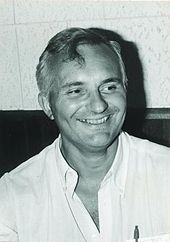Jacques-Louis Lions
Jacques-Louis Lions (born May 2, 1928 in Grasse , † May 17, 2001 in Paris ) was a French mathematician who dealt with partial differential equations and numerical analysis.
life and work
His father was the mayor of Grasse, and Lions attended school in Grasse and Nice after activities in the French Resistance during the Second World War , where he also met his future wife Andrée Olivier (married 1950). From 1947 to 1950 he attended the École normal supérieure in Paris (a fellow student was Bernard Malgrange ). He then went to the University of Nancy on a CNRS scholarship to do his doctorate with Laurent Schwartz , whose introduction of distributions revolutionized analysis at the time. After receiving his doctorate in 1954, he became Maître de conférences in Nancy, where he also became a professor. In 1963 he went to Paris as a professor at the Faculté des Sciences. From 1966 to 1986 he was also a professor at the École polytechnique . When the universities were reorganized in Paris in 1970, he went to the University of Paris VI (Pierre et Marie Curie). In 1973 he became a professor at the Collège de France (he chose the title “Analyze Mathématique des Systèmes et de leur Contrôle” for his chair), where he retired in 1998. In 1979 he became director of INRIA (Institut National de Recherche en Informatique et Automatique). From 1984 to 1992 he was director of the CNES (Center Nationale d´Etudes Spatiales).
Lions dealt in various ways with partial differential equations, later also with their numerical solution and application in control theory. In the 1950s, under the influence of Jean Leray, he worked on the Navier-Stokes equations . In 1959 he published with Giovanni Prodi a proof of the uniqueness of weak solutions of the Navier-Stokes equations in two spatial dimensions. He also improved Eberhard Hopf's proof of the existence (for great times) of weak solutions in limited areas in three dimensions. He also dealt with interpolation theory. He advocated the use of computers and the development of numerical methods when mathematics in France was still predominantly dominated by the abstract methods of the Bourbaki school. He gave lectures on the subject in the 1960s at the Blaise Pascal Institute of the CNRS, which were widely used.
In 1973 he was elected to the Académie des Sciences . He held various positions in an advisory capacity, including for France Telecom, the French state electricity company, the space agency and the state meteorologists. From 1991 to 1995 he was President of the International Mathematical Union . From 1996 to 1998 he was President of the French Academy of Sciences.
In 1986 he won the John von Neumann Prize and in 1991 the Japan Prize . He received numerous honorary doctorates and was, among other things, commander of the Legion of Honor (1993). In 1958 ( Problèmes mixtes abstraits ), 1970 ( Inequations variationelles d´evolution ) and 1974 ( Sur la théorie du controle , plenary lecture) he was invited speaker at the International Congress of Mathematicians . In 1996 he was elected a Foreign Member of the Royal Society . In 1982 he was admitted as a foreign member to the then Academy of Sciences of the USSR , in 1986 he was elected to the American Academy of Arts and Sciences and in 1996 to the National Academy of Sciences .
His son Pierre-Louis Lions is also an eminent mathematician and recipient of the Fields Medal.
His doctoral students include Roger Temam , Alain Bensoussan and Philippe Ciarlet .
Fonts
- with Enrico Magenes : Problèmes aux limites non homogènes et applications. 3 vol., 1968, 1970
- Contrôle optimal de systèmes governés par des equations aux dérivées partial. 1968
- With L. Cesari: Quelques méthodes de résolution desproblemèmes aux limites non linéaires. 1969
- With Robert Dautray : Mathematical analysis and numerical methods for science and technology. 9 volumes, 1984/5
- With Philippe Ciarlet : Handbook of numerical analysis. 7 vols.
- With Alain Bensoussan , Papanicolaou: Asymptotic analysis of periodic structures. North Holland 1978
literature
- A. Dahan-Dalmedico: Jacques-Louis Lions, un mathématicien d'exception entre recherche, industrie et politique. Éditions La Découverte, coll.Histoire des Sciences, Paris, 2005, ISBN 2-7071-4709-5
Web links
- John J. O'Connor, Edmund F. Robertson : Jacques-Louis Lions. In: MacTutor History of Mathematics archive .
- Obituary at the SIAM from Temam
- Lions in the Mathematics Genealogy Project
- Obituary in Automatica
- French page with bibliography and recollections
- Obituary, European Mathematical Society Newsletter, December 2001, pdf
Individual evidence
- ^ Brother of the temporary President of the EU. Prodi and Lions independently came up with evidence
- ^ Entry on Lions, Jacques Louis (1928-2001) in the archives of the Royal Society , London
- ^ Foreign members of the Russian Academy of Sciences since 1724. Jacques-Louis Lions. Russian Academy of Sciences, accessed October 1, 2015 .
| personal data | |
|---|---|
| SURNAME | Lions, Jacques-Louis |
| BRIEF DESCRIPTION | French mathematician |
| DATE OF BIRTH | May 2, 1928 |
| PLACE OF BIRTH | Grasse |
| DATE OF DEATH | May 17, 2001 |
| Place of death | Paris |
